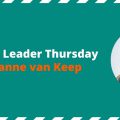
Thoughtleader Thursday – Gerlien van Dalen about reading skills, reading pleasure and reading promotion: “We want to offer opportunities by giving everyone a good literate foundation.”
In the Thoughleader Thursday series we speak to an expert in the field of a specific issue every Thursday. This week we speak to Gerlien van Dalen, director of Stichting Lezen. She tells us about the importance of reading skills, reading pleasure and reading promotion at a time when education shifted from physical schools to home and digital. Gerlien talks about existing campaigns and new, creative and flexible initiatives that emerged during the corona crisis to keep reading accessible and, above all, fun.
What were the expectations regarding your issue before the corona crisis started?
“Before the crisis started, we focused on the same topics that still concern us today, namely promoting reading among babies, children and young people. We want to give them the opportunity to grow into skilled and motivated readers. We are talking about a group up to and including teacher training college. We did this through physical consultations and by bringing reading promotion to childcare and schools. This has changed somewhat due to the closure of schools and libraries. As a result, we cannot simply bring more reading promotion to schools. Writers cannot always go to schools either, which has been partly replaced by digital class visits. While we used to have physical contact with the target groups, we had to find other ways of doing this during the corona crisis.”
What happened to the issue during the crisis?
“We have inventoried all kinds of initiatives that schools and libraries could use remotely to promote reading among children. We have also made our own activities more digital. Concrete examples are our annual Reading Central conference, which took place in the form of a webinar and attracted more than a thousand participants, much more than the physical conference. Or the final day of The Young Jury, a reading event for young people between 12 and 15 years old. Normally the final day is physically held in Tivoli Vredenburg, but this year it was an online broadcast. The broadcast was well watched and the schools participated well. The principle 'necessity breaks law' is clearly reflected here - although I would rather speak of 'necessity makes creative'. Those new online ways to bring reading to schools also worked well.
However, a vulnerability these days is that you cannot reach every group equally well. This is particularly reflected in the reach of parents with young children. Due to the temporary closure of libraries and clinics, we noticed that it was more difficult to contact this group. via, for example, the VoorleesExpress or the BoekStartcoach. You can read about such vulnerabilities in all kinds of reports, including those from the Education Inspectorate. People who have fewer opportunities have even fewer opportunities due to corona. Also because they are less reached by authorities. As a result, inequality of opportunity increases and that is precisely something we want to prevent with our work. We want to offer opportunities by giving everyone a good literate foundation, which is why we focus on promoting reading in language-poor families in order to break the cycle of low literacy.
The closure of childcare institutions and schools also made reaching children more difficult. Reading consultants from libraries could no longer be physically present. Normally thousands of childcare institutions and schools are visited every week through our BoekStart and the Library at School programs, but now only online services could be offered.¨
What is the current status of the issue?
“We know that if children do not receive as much reading instruction at home, they miss important things, which has a negative effect on their development. Now that schools have started again, we see that attention is mainly paid to the general curriculum. Less time is made available for free reading. In order to give the importance of reading pleasure a more prominent place, we aim to create more space for this. Anyone who accumulates reading miles simply reads better. This is independent of methods or teaching material.
Within the theme of promoting reading, we also referred to the Royal Library in the spring. They had made their digital library free and open to everyone. They also scaled up the number of digitally accessible children's books. This offers good opportunities to ensure that books can continue to reach readers. I think this has been a very important development during the corona crisis: that books remain accessible. From the Reading Foundation we also contributed to the book trade's '#Ik Read Home' campaign. That campaign actually got people to read more. And it is interesting that more collaborations emerged due to the crisis. Together you can then take a better approach to encouraging reading.”
What are you going to do with the issue in the near future?
“We recently presented the manifesto 'Call for an ambitious reading offensive' with the Reading Coalition to ministers Van Engelshoven and Slob. This has been widely taken up by various media and educational parties and is also supported by, for example, the SER. The importance of literacy is therefore widely recognised.
We have recently expanded our network around reading. We want to expand this further in the near future, also to give reading a more solid place in society. We will continue with the programs we have now, but we also want to organize broadening from different policy areas in the same way around reading. We do this, for example, within the family approach with all kinds of parties (municipality, library, childcare, health clinics, youth care) that deal with parents and children. We want to ensure that reading is a central subject there and fortunately the willingness to do so is increasing. A good language base and vocabulary takes children further and we make parents aware of this. We switch between different layers: national level (strategic side), provincial and local level. In this way we try to make those networks stronger.
In addition, our campaigns such as the National Reading Days and the National Reading Competition try to continue to give an impetus to reading and reading pleasure at home, in childcare, at school and in the library. We also pay attention to children in multilingual situations. For the Reading Days, for example, we have made translations of the Picture Book of the Year, so that (grand)parents can read to their children in their mother tongue with the Dutch picture book next to it. In this way we broaden our campaigns. We will certainly continue to engage in research, just as we did before the corona crisis.
For the upcoming House of Representatives elections, my dream would be that reading – prevention of low literacy, but also promotion of reading – is discussed in the cabinet formation. If investments remain too small in this area, you will always be left behind. For example, you would want the school library to be well organized in all schools. This requires larger investments, but you will get that back as a society in the longer term. Politicians often have shorter-term goals, but a long-term goal such as a well-literate Netherlands is of enormous importance.”



